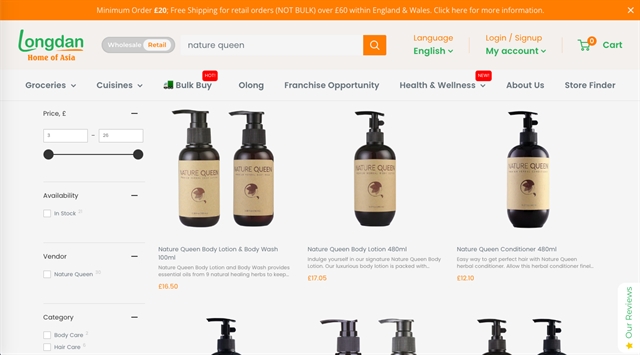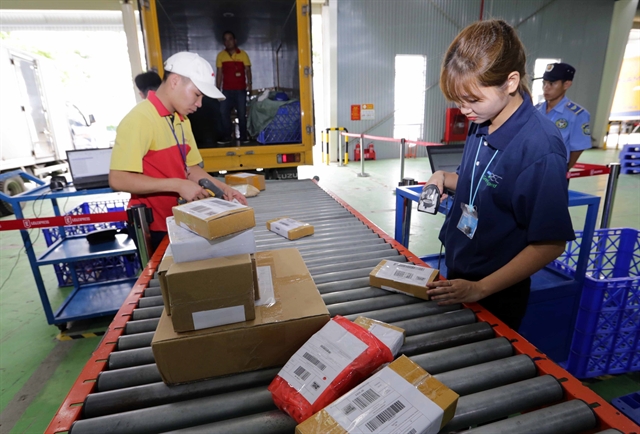 Economy
Economy

Ly Ly Cao
HÀ NỘI — The United Kingdom (UK) is rapidly emerging as an attractive export destination for Vietnamese goods, fuelled by the Việt Nam – UK Free Trade Agreement (UKVFTA).
With exports to the UK nearing US$6.4 billion in the first ten months of 2024, an increase of 22 per cent compared to the previous year, e-commerce stands out as a promising channel to further enhance Việt Nam’s trade presence in this dynamic market.
The UKVFTA offers significant tariff reductions, enabling Vietnamese products to compete effectively with counterparts from countries like China, India and Brazil, which lack similar agreements.
Goods such as textiles, footwear, electronics and processed foods have established a firm footing in the UK, while sectors like healthcare products and steel show robust growth potential.
Vietnamese products are now widely available in major UK retail chains like Tesco, Sainsbury's, Waitrose and Whole Foods, as well as in niche Asian supermarkets, Hoàng Lê Hằng, First Secretary at the Việt Nam Trade Office in the UK, said at a recent event on export strategy for market penetration and brand building in the UK.
She emphasised the increasing visibility of Vietnamese brands, such as ST25 rice and Nature Queen herbal products, as key contributors to this success.
 |
| Products of Nature Queen on the website of the Longdan supermarket chain. Screenshot |
The new frontier
Global cross-border e-commerce is experiencing exponential growth. At the 2024 E-commerce Connection and Development forum, Lê Hoàng Oanh, director general of the Việt Nam E-commerce and Digital Economy Agency, revealed that the sector has grown from $1.9 trillion in 2021 to $2.3 trillion in 2023 and is projected to reach $7.9 trillion by 2030.
“Cross-border e-commerce is a powerful lever for online exports,” she said, highlighting its transformative potential.
According to the 2023 E-commerce Report by the agency, 13 per cent of Vietnamese businesses use websites or e-commerce applications for import-export activities. Among them, 53 per cent export through e-commerce platforms, while 47 per cent rely on self-developed websites or applications.
Despite the challenges posed by the pandemic, numerous cross-border e-commerce export enterprises continue to sustain annual growth rates of 15-20 per cent, Nguyễn Minh Đức, deputy general secretary of the Việt Nam E-commerce Association (Vecom), said at the recent event in HCM City.
This trend underscores the vital role of digital channels in modern trade.
Bridging the digital divide
Despite these promising trends, many Vietnamese businesses remain in the early stages of digital transformation. Building the necessary infrastructure - digitised supply chains, integrated platforms and robust human capital - is crucial for long-term success.
Nguyễn Thị Minh Huyền, deputy director general of the Việt Nam E-commerce and Digital Economy Agency, said that it is necessary to support small and medium-sized enterprises (SMEs) struggling with online exports.
 |
| Commodity classification by an e-commerce company. — VNA/VNS Photo |
To address this, the department is developing an Online Export Ecosystem (Ecomex) to provide tailored solutions that align with the Government's vision of helping Vietnamese businesses access international markets through e-commerce.
The agency also organises regular training programmes to improve workforce skills, update regulatory knowledge and familiarise businesses with new technologies.
"The era of traditional trade is giving way to digital platforms. Việt Nam must seize this opportunity to not just compete but lead in the global e-commerce arena,” Hoàng Vĩnh Long, chairman of the Việt Nam Tea Association, told Việt Nam News.
Long highlighted ongoing efforts to digitise the tea industry, including plans for an e-commerce platform to streamline operations and introduce Vietnamese tea to international consumers.
Platforms like Amazon UK and eBay offer a ready-made marketplace, while specialised sites targeting ethnic foods and fair-trade products provide niche opportunities.
The adaptation of Vietnamese exporters to these platforms can significantly reduce the reliance on traditional distribution channels. Moreover, e-commerce allows businesses to bypass intermediaries, directly reaching consumers and retaining higher profit margins.
The Vietnamese Government and trade associations play a pivotal role in facilitating this transition. Events like the upcoming 'Vietnamese Goods Week in the UK' provide opportunities to build brand awareness and establish trust with consumers.
"Nevertheless, to establish an e-commerce platform, we must also have the necessary infrastructure. This entails each business digitising all product-related content, including inventory and quality and subsequently integrating it with the trading platform," Long said.
"This process poses one of the current challenges we are encountering, prompting us to seek technological solutions to aid our enterprises."
There are also challenges in international shipments. Logistics, overall and last-mile delivery, in particular, are pivotal factors that significantly influence the seamless shopping experience from the moment of order placement to the receipt of goods by the consumer.
Collaboration between Vietnamese producers and UK-based logistics companies can streamline the supply chain, addressing concerns about delivery times and product freshness.
Meanwhile, government-led initiatives such as Ecomex demonstrate the focus on providing tangible solutions to exporters. — VNS